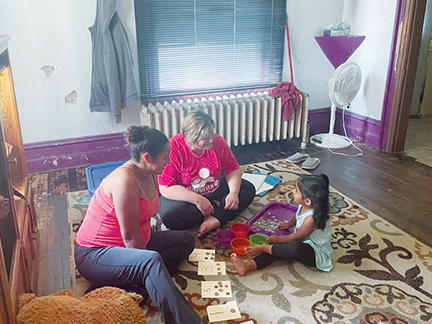Funding supports school, community efforts to strengthen families, address trauma
By JULIE MINDA
The prevalence of mental illness is about the same in rural populations as it is in urban populations, but there is far less access to mental health services in rural areas.

Lori Henrichs, center, a parent educator with Southwestern Community College, takes part in a Parents As Teachers home visit with a Corning, Iowa, mother and daughter. CHI Health provides funding to support the Parents As Teachers program.
CHI Health has been working with local partners to identify the mental health issues affecting rural communities in its service areas and helping to set up and fund programming to address unmet needs. A top focus is the mental health of youth.
CommonSpirit Health, CHI Health's parent system, has made grants to fund a wide variety of community-based mental health interventions. The programming includes providing consultation and training on mental health to teachers and other school staff,
offering mental health first aid training in schools, building mental health referral networks, establishing wellness centers that include mental health services, and providing technology to connect teachers and students which has been shown to
lead to greater student engagement and resiliency.

Carroll
Ashley Carroll is the division manager of community benefit and advocacy for CHI Health, which has 28 hospitals and a network of other facilities in Nebraska, southwest Iowa, North Dakota and Minnesota. She says, "Behavioral health has been identified
as a top need virtually everywhere in our service area. As a leading behavioral health service provider in our region we have been asking how do we fill the gaps by complementing clinical services with community-based prevention programs." The
grant dollars and community partnerships have been helping them to do this.
A heavy lift
Analysis from the Rural Health Information Hub indicates that people in rural areas can have challenges getting the mental health
services they need because of the poor accessibility, availability, affordability and acceptability of such services there. The Rural Health Information Hub is supported by the Health Resources and Services Administration.
The analysis says the accessibility issues are related to the long distances rural dwellers often must travel to reach service providers. The availability problems have to do with the chronic shortages of mental health professionals in these areas.
The affordability concerns relate to the fact that many people in remote areas struggle to afford insurance and can't pay out-of-pocket costs for health care. The acceptability issue has to do with the stigma attached to mental illness in many
rural areas and the difficulty of maintaining confidentiality when accessing services in a small town.
Carroll says CHI Health's community health needs assessments underscore that mental health concerns are interwoven with socioeconomic pressures that are prevalent in many rural communities.

Westphal
Joyce Westphal is a social worker and infant and early childhood mental health consultant who is contracted by CHI Health to help early childhood education providers and day cares in Iowa's Taylor and Adams counties to identify and address mental
health concerns among very young children.
She says that mental health stressors are widespread among both children and their teachers in economically depressed communities. Many teachers and students have suffered multiple adverse childhood experiences, or ACEs, that cause or contribute to
mental health concerns. The Centers for Disease Control and Prevention says adverse childhood experiences can include witnessing or experiencing violence and abuse or growing up in a family with mental health or substance use problems.
Without intervention, these and other mental health stressors in a child's life can have a lifelong impact on their well-being. Carroll says: "We're hearing that there are profound challenges, and we need to be increasingly attuned to the needs of
these children. They often are carrying more than backpacks on their shoulders."

Rodriguez Alvizo
Spectrum of interventions
Lucia Rodriguez Alvizo and Sarah Stanislav are coordinators of Healthier Communities & Community Benefit, the community benefit arm of CHI Health. Rodriguez Alvizo says all the programming that the
system develops to address disparities in access to mental health services is done with community partners, including schools, early childhood centers, social service agencies and first responders. Stanislav says a goal is to develop strong referral
pathways in communities for families in socioeconomic need.

Stanislav
Carroll says the programming that CHI Health and its partners are developing is aimed at increasing families' protective function and reducing their risk factors for mental illness. "We're trying to spot socioeconomic issues, assess unmet needs and
connect families with resources. We ask how can we get them set on a healthy and positive trajectory."
One of the longest-running and most expansive collaborations is through CHI Health Mercy Corning in Corning, Iowa, where Carroll says CHI Health has funded a spectrum of interventions for youth mental illness. CHI Health is part of the Behavioral
Health Coalition of Taylor and Adams County, Iowa, which has secured more than $1 million in grant dollars since 2017 from the Mission and Ministry Fund, the grantmaking program established by Catholic Health Initiatives and carried on by its
parent CommonSpirit.
Programming, training and technology the Behavioral Health Coalition has put in place using CommonSpirit grants and healthy communities funds and other philanthropic funding along with government investments includes:
- Parents As Teachers. The program sends early childhood educators to the homes of toddlers and preschool students to conduct developmental assessments and help parents access services for their kids if warranted. Of the families in the program,
84% were at or below 200% of the federal poverty level.
- Trauma-informed training for administrators and staff of early childhood education centers and day cares, including helping them understand the impact of trauma on behavior. The training is credited with reducing negative behaviors in preschool
classrooms by 90%.
- Technology that enables chronically truant school-aged children to attend school virtually, either for a short or extended time period. The program has boosted school attendance by 88% among those students.
- Sexual abuse prevention training that teaches youth and their parents to recognize grooming behavior in potential predators.
- Mental health first aid training that gives community members the knowledge to assist people with mental illness and direct them to organizations that can provide services.
Early intervention
Under her contract with CHI Health, Westphal teaches the staff and administrators in early childhood education centers and day cares about the social-emotional development of young children and how to use trauma-informed
approaches to aid children who may have a mental health problem, or a parent with a mental health problem, and are not thriving in the classroom.
She says that in day care and childhood education, staff often don't have a formal education beyond high school. Those who do have an associates' certificate in child development may have had very limited, if any, training in childhood mental illness.
She offers practical information about how to work with emotionally troubled children and their parents.
She also provides consultations for staff and administrators who are having trouble managing kids' behaviors in their centers. And she helps staff and administrators reflect on how their own early childhood traumas and the strains they are experiencing
both at work and in their personal lives are impacting their response to the children they care for.
"We all have our own emotional stuff that impacts our relationships with others, including children, and the more we are able to reflect on how our emotional triggers intersect with what a child is experiencing or how they are communicating with us
through their behavior, the better we are able to make adjustments in our responses that will enhance the child's experiences and development," Westphal explains.
She says her focus is on teaching adults how to foster healthy relationships.
She says this type of guidance enables early childhood center staff to better relate to the children in their care, to identify and help address mental health issues among the children before they escalate and to ensure they're creating a nurturing
environment for those children. She says early intervention is key in heading off acute mental health issues.
A similar philosophy guides additional mental health programming CHI Health supports in primary schools in Taylor and Adams counties.
Carroll notes that training school staff to be tuned in to the mental health needs of the community's youth improves the chances that issues can be identified early and addressed.
CHI Health supports partnerships keyed in on youth mental health
It's been more than a year since the American Academy of Pediatrics, the American Academy of Child and Adolescent Psychiatry and the Children's Hospital Association declared a national state of emergency in children's mental health.
Mental illness — including among children — has consistently ranked a top issue in communities CHI Health serves.
The system leads or otherwise participating in community-level partnerships to develop programs that assess and address youth mental health. The health system also has placed its mental health clinicians in some schools and done so on a permanent
basis in some cases.
Some of this work that is farthest along within CHI Health's Midwest region includes:
- In Kearney, Nebraska, CHI Health, Kearney Public Schools and other local collaborators have formed Buffalo County Healthy Minds. Using funds from CHI Health and others, the group has provided resources to teachers and staff on de-escalation
of mental health-related incidents, provided mental health first aid and similar training to teachers and has strengthened the mental health referral system. This programming is aimed primarily at elementary, middle and high schools.
- CHI Health is taking a different tack in Schuyler, Nebraska, by aiming to reduce the socioeconomic stressors on families in part to reduce risk factors for mental illness. CHI Health is screening prenatal patients and families of pediatric
patients for eligibility for the Special Supplemental Nutrition Program for Women, Infants, and Children. In partnership with the No Kid Hungry nonprofit, the local health department and a local food pantry, they're also making families
aware of local food resources and ensuring they get the food vouchers they need.
- In partnership with Grand Island Public Schools in Nebraska, CHI Health set up a fee for service wellness center in the high school that provides mental health and substance abuse services to students along with physicals, immunizations
and urgent care. An endowed scholarship helps defray care costs for some uninsured or underinsured students and the center receives grant support from the CHI Health St. Francis Foundation.
- In Nebraska City, Nebraska, CHI Health contracts with a local collaborative to provide a licensed mental health practitioner to area schools. This clinician facilitates crisis debriefings, provides individual therapy and trains and educates
teachers and staff on spotting and responding to mental illness warning signs in students. While the work is an offshoot of activity originally funded by Catholic Health Initiatives' Mission and Ministry Fund, it now is paid for in
part by insurance claims and by grants from other organizations.
- In Valley, a suburb of Omaha, Nebraska, CHI Health and the DC West Community Schools public school system collaborate to give elementary, middle and high school students access to mental health care. The CHI Health in-school therapist
provides billable individual therapy services. If students do not have insurance, the therapist provides treatment at no cost to the student, and the school system covers the fee. The school system also pays for a CHI Health therapist
to provide mental health education, training and consultation to staff.
Additional initiatives in this vein exist across CHI Health's four-state Midwest region. For instance, CHI Health provides mental health mini grants to several schools in the Missouri Valley, Iowa. And all of CHI Health's North Dakota hospitals
have violence prevention programming that is funded by CommonSpirit Health's Mission and Ministry Fund. The North Dakota work includes delivering or engaging in healthy relationships training and supporting a program called Coaching Boys
into Men.
All such programming supplements fee-for-service behavioral health care that CHI Health offers in its service areas. CHI Health has been expanding that network with telehealth, integrated primary care — behavioral health clinics and
partial residential programs for people with moderate to acute mental health challenges.
— Julie Minda